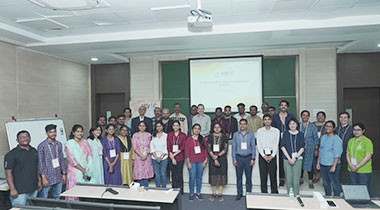
Events
Measles and Rubella Transmission Modelling Workshop
Feb 5-8, 2024
The first Measles and Rubella Transmission Modelling Workshop was conducted from 5th-8th February, 2024. The four-day workshop featured informative presentations by distinguished domain experts from India, followed by engaging hands-on sessions facilitated by trainers from the Vaccine Impact Modelling Consortium (VIMC).
More than 20 researchers with a background in mathematics or statistics attended the workshop from IIT Bombay and various other institutes including the Ethiopian Public Health Institute; Calcutta University; ICAR-NIVEDI Bengaluru; ICMR; ICMR-NIE; VIT Chennai; IIPH Delhi; Motilal Nehru National Institute of Technology Allahabad; and IIT Kanpur.
Prof. Siuli Mukhopadhyay from the Department of Mathematics at IIT Bombay and principal investigator of NDMC began Day 1 of the workshop with a brief introduction. This was followed by presentations on “Country's big leap towards measles and rubella elimination” by Dr. Pawan Kumar, Additional Commissioner at the Ministry of Health & Family Welfare, Government of India; “Congenital rubella surveillance” by Dr. Manoj Muhrekar, Director of the National Institute of Epidemiology, and “Sub national level measles modelling and results” by Prof. Siuli Mukhopadhyay and Dr Sagar Pandhare, IIT Bombay. The presentations were followed by hands-on R sessions covering the fundamental concepts of mathematical modelling, which were facilitated by trainers from VIMC, Prof. Mark Jit, London School of Hygiene and Tropical Medicine; Prof. Amy Winter, University of Georgia; Prof. Mathew Ferrari, Pennsylvania State University; Dr. Emilia Vynnycky, UK Health Security Agency; and Dr. Niket Thakkar, Institute for Disease Modelling. The session began with “Epidemiology 101 terms and concepts” facilitated by Prof. Mark Jit. The four core concepts, namely, measurement, bias and confounding, type of epidemiological studies and causation were introduced. This session was followed by “Introduction to Infectious Diseases Models” conducted by Prof. Amy Winter. The four primary goals of the mechanistic models, i.e. theoretical modelling, inference modelling, strategic modelling and forecasting modelling were elaborated. The day concluded with an interactive session on “Susceptible-Infected-Recovered mechanistic models” moderated by Prof. Mark Jit.
The second day commenced with an online presentation on “Results of measles-rubella serosurveys in different states of India” by Dr Nivedita Gupta, Head of Division of Communicable Diseases at ICMR. Next, Dr. Ratnesh Murugan, technical expert at the WHO Country Office for India, delivered a presentation on the “National update on measles and rubella elimination” followed by a presentation on “Spatial analysis and correlates of zero-dose measles vaccine prevalence in India” by Prof. Rama Pal, Dr Divya Kappara, and Ms. Anshika Tiwari from IIT Bombay. Prof. Mathew Ferrari explained the “SIR-dynamics of measles and rubella” followed by the interactive hands-on session on “SIR + births and deaths + seasonality, SIR + births and deaths + seasonality + RI, SIR + births and deaths + seasonality + RI + SIA”. Dr. Emilia Vynnycky introduced the “Age effects on measles and rubella dynamics” and conducted a hands-on session on the implementation of the “Berkeley Madonna code”.
The third day of the workshop kicked off with a recap of previous sessions. Prof. Amy Winter introduced the “Model fitting approaches and challenges for catalytic model” followed by “Catalytic model code | Catalytic model code for rubella serological data”. Dr. Niket Thakkar introduced the “Model fitting approaches and challenges in the dynamic models and probability”. The interactive sessions on “Linear regression example” and “Psuedo codes” followed by “Model fitting approaches and Challenges in stochastic simulation algorithms” and “Stochastic simulation” were conducted by Prof Mathew Ferrari. The day concluded with the introduction to the “TSIR model” and a model demonstration for Somalia and UK.
The last day of the workshop included discussions on "Strategic modelling and impact assessment" followed by interactive sessions with VIMC modellers. The speakers addressed the questions and the queries of the participants regarding their individual projects. The workshop concluded with discussion of some “Open questions in M&R modelling” by the VIMC trainers and closing remarks by Prof. Rama Pal, Department of Economics, IIT Bombay and principal investigator of the VPD group of NDMC.
Overall, the workshop was very well received. In a post-workshop survey, all participants rated the workshop as either good or very good. The participants found the hands-on sessions very informative and helpful in providing a clear understanding of epidemiological concepts as well as modelling techniques. They particularly appreciated the engaging interactive sessions and that complex concepts were simplified into easily understandable explanations, making the learning experience both enjoyable and enlightening.
